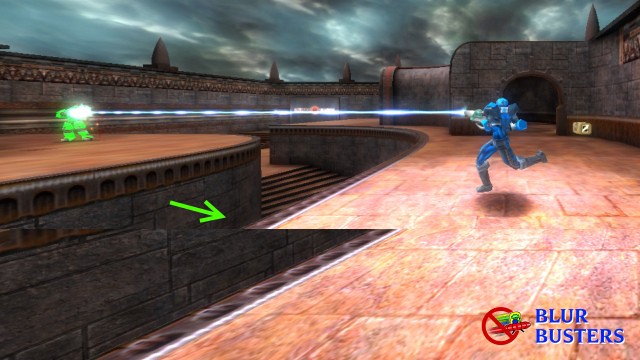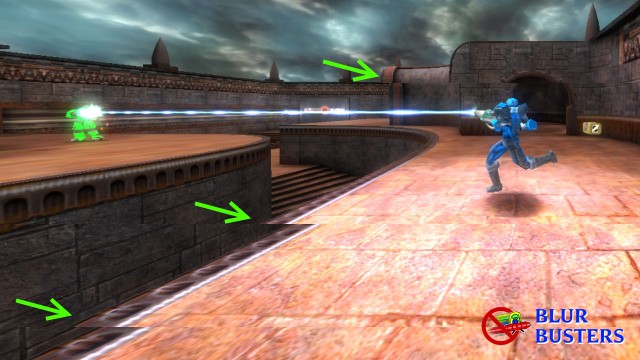Page 1 of 1
Backlight strobing & FPS cap
Posted: 18 Aug 2017, 19:00
by Xizel
For CSGO, I've read that having higher FPS than your refresh rate is good for lower input lag. However, I'm using backlight strobing and getting image defects (screen tearing?) since my FPS is 300-500 and my refresh rate is 144Hz. Is it advisable to cap my FPS to 144? What about a multiple of 144?
Re: Backlight strobing & FPS cap
Posted: 18 Aug 2017, 19:55
by Haste
Hi and welcome to the forum!
That's an excellent question.
My opinion is that it would not be a good idea. As you would get a relatively static tear line (or several if capping at multiples)
And that would increase tearing perception compared to the uncapped 300-500fps scenario.
Another thing to consider is that by reducing your frame rate. You increase the offset between frames. And that would increase tearing perception as well.
See this comparison between
2 frames in one scan out:

and 4 frames in one scan out:

Re: Backlight strobing & FPS cap
Posted: 18 Aug 2017, 20:31
by RealNC
The higher the FPS, the better.
You could try fast sync (nvidia driver) or enhanced sync (amd drivers). But your mileage may vary. At 500FPS, these are really good. At 300FPS, it's OK. Any lower, and it will be kind of crap. At least with fast sync. No idea how enhanced sync behaves.
Re: Backlight strobing & FPS cap
Posted: 18 Aug 2017, 21:06
by Chief Blur Buster
Xizel wrote:For CSGO, I've read that having higher FPS than your refresh rate is good for lower input lag. However, I'm using backlight strobing and getting image defects (screen tearing?) since my FPS is 300-500 and my refresh rate is 144Hz. Is it advisable to cap my FPS to 144? What about a multiple of 144?
Three options
(1) Strobing looks best with VSYNC ON (or 144 cap).
There is a low-lag method of VSYNC ON: Go to
http://www.testufo.com/refreshrate and then use RTSS software (CSGO fps_max is not accurate enough) to cap the frame rate at 0.01 below the number you see in the precisionrefreah rate test. This allows you to ise VSYNC ON without as much lag.
Fast Sync is another alternative. Run it at uncapped frame rates.
(2) Increase frame rate more.
Strobing amplifies microstutters. The lack of motion blur makes the microstutters much more visible. To compensate, increase the frame rate to compensate (reduce microstutters via sheer frame rate). Even 300fps is not always enough to eliminate strobe-amplified microstuttering. That can be hard without upgrades.
Also, mouse is a microstutter weak link for strobing. Make sure you improve your mouse as much as you can -- the new SteelSeries 1:1 tracking mouse is showing impressive promise. Jorim bought one and he likes it. We have a
Blur Busters Mouse Guide
(3) For best competitive results, you might turn off strobing for certain games
Strobing is wonderful when it really benefits your game. But you might for example, turn it on for some games, and turn it off for others. It is game and game tactic dependant.
Also, you might not benefit from strobing if you only stare at crosshairs (stationary gaze doesn't benefit from blur reduction). While, for a different game -- you could, if you are trying to eye-track tons of moving objects in Rocket League. Motion clarity can sometimes give you reaction time advantages (that outweigh the minor lag of strobing) but only when a specific game play tactic has enough advantage to warrant strobing.
Re: Backlight strobing & FPS cap
Posted: 19 Aug 2017, 00:05
by lexlazootin
By any chance is the monitor you are running a 240hz G-Sync?
Have you tried running CS:GO at a capped 230 and using G-Sync? The input latency would be lower then running 144hz with strobed or not strobed and you won't have to worry about tearing.
And i know this is more of a personal thing but i can't support a mouse company with such shitty business practices. Their most recent "why latency can destroy you" they say
"compatible with all your systems and have low button latency, you are trusting the firmware to be well written. Not all firmware is created equal, and poorly written firmware from inexperienced company results in unstable and unexpected results, compatibility issues and a dreaded latency increase."
And
When looking for a new gaming mouse, always go with the established competitive gaming brands that have been making mice for esports for more than a decade.
This is a company that purposefully make their lower end mice worse by adding filtering and acceleration and have COMPLETEY forgotten the time they release the Kinzu v2 PRO with 30ms worth of mouse button input latency. It was so bad you could feel it. This is also a mouse that for 1600dpi, it was simply 800dpi doubled to fake 1600dpi. Truly a experienced company.
http://imgur.com/DF083rJ
They also talk about how 2000hz is a marketing term and how it doesn't really exist when in theory you could release a mouse with 2000hz and/or more through USB3.
They also have a article "Why Higher CPI Doesn't Mean Better"
Fake News & Alternative Facts
Judging a mouse solely by its CPI is a misleading and dangerous marketing trend. A gaming mouse with a high CPI and otherwise low specs is like a book with a “Game of Thrones” cover but “50 Shades of Grey” pages.
but they must of forgot how they released their original Sensei with 11,000 CPI by doubling up their DPI... such a hypocritical company, and they talk about other brands with such hypocrisy it makes me angry.
Re: Backlight strobing & FPS cap
Posted: 19 Aug 2017, 12:31
by jorimt
Regarding SteelSeries, I exclusively use 800 CPI, so higher CPI issues will never affect me. I was previously using a Deathadder Elite, and the Rival 310 has lower click latency (physical or firmware differences, who knows) and tracking is, thus far, more accurate at like-for-like settings.
Personally, I couldn't care less about a company's history or opinions; if they make a good product, I buy it, if they make a bad one, I avoid it, simple as that. The Rival 310 is priced pretty competitively as well.
Also, I'm aware input device preferences are pretty darn subjective, but this is the only mouse I know of that has/claims a true 1:1 sensor, and it feels as good/better than the DA Elite, which is already a very decent gaming mouse.
It's only a matter of time before other companies follow with "true" 1:1 sensors (and hopefully, more importantly, 2000Hz+) though, so no doubt you and others will be able to pick one up in your preferred brand eventually.
/offtopic
Re: Backlight strobing & FPS cap
Posted: 19 Aug 2017, 20:20
by Chief Blur Buster
Disclaimer:
Practices aside, I need to disclaim that personal purchase choices are a personal choice. Every contributor, moderator/admins, writer/reader, tester, all have their own different opinions, and they are not representative of any endorsements nor specific collective Blur Busters opinion. We don't *always* agree on the best hardware, even!

That said, I'm looking forward to more 1:1 sensors! They ARE sweet, and need to be in mice (regardless of brand).
And 2000Hz mice for future 240Hz+ monitors, especially for those of us who prefer VRR or strobing (where mouse microstutters can sometimes be more amplified than via VSYNC OFF)
Re: Backlight strobing & FPS cap
Posted: 19 Aug 2017, 21:57
by lexlazootin
I personally don't have any problems with any suggesting anything they want, but i do try to support the brands that have at least tried to do the right thing.
For example, Logitech to my knowledge never bragged about their DPI, artificially bumped it up and/or added filtering/acceleration for any reason all the way back to the MX500~ series in 2002. And they all have low click latency. They don't brag about how good their mice are, they just do it.
Also is everyone ok with the "1 to 1 tracking" false advertising? Sure it might be good but you zoom in enough on any Delta and it's going to show bumps.
Other great notable examples is the Zowie series where they talked up how good they are but then released mice with 20ms of click delay. And the Scream mouse where you couldn't hold down two buttons.
But hey, if they release a good mouse, it would be the first time in ages IMO. I would love to see actual testing done on the mice since 1-1 doesn't exist... but that's ok.
Re: Backlight strobing & FPS cap
Posted: 19 Aug 2017, 22:16
by jorimt
I can't say for certain. I'd like to test it in-depth myself, but I'm no mouse testing expert. There are some mouse enthusiast reviews on YouTube (Rocket Jump Ninja, etc) you can look up for more info.
As for whether their claim of 1:1 tracking on their 350 IPS (PixArt) sensor is false, I believe they simply claim there are zero filters/tracking compensation applied from "100 to 3500 CPI." At "3,500 to 12,000 CPI," they themselves say jitter reduction is re-engaged.
SteelSeries also stated this in a reply to a comment in the Rocket Jump Ninja review (take it for what you will):
"you're right! It's a custom-engineered 3360 that has a custom SROM to create true 1 to 1 tracking, incredibly low latency, and advanced jitter reduction."
To be clear, I'm not endorsing the mouse on behalf of Blur Busters, or even myself, I just bought it and find it as good or better than the Deathadder, at least from what I can "feel." It certainly isn't worse, or I would have switched back.
If you want to discuss this further, we can create a new "opinion" thread (not that I really have anything else to express on the subject), otherwise, I say to each their own and nuff said.
Re: Backlight strobing & FPS cap
Posted: 20 Aug 2017, 11:57
by Chief Blur Buster
Yeah, one needs to define what they mean exactly, by "1:1'.
We need more mice innovation by all the mice companies, regardless.
I'm holding my breath for "true-2000Hz report rate" (which may not always matter as much for CS:GO VSYNC OFF, but matters more for strobing & variable refresh rates due to beat-frequency microstutter between mouse report rate & display refresh rate). The beat-frequency microstutters becomes more visible at 240Hz and 480Hz. We are the first in the world to publish test results for 480Hz, and these stratospheric refresh rates begin to (again...) show the limits of 1000Hz report rate at least in "non-VSYNC-OFF' situations.

